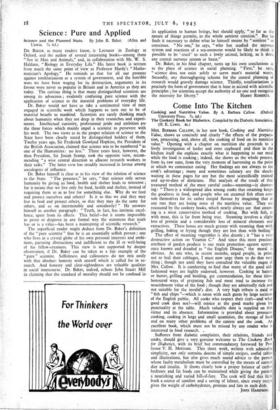Science : Pure and Applied
DR. BAKER, as many readers know, is Lecturer in Zoology at Oxford, and the author of several interesting books—among them " Sex in Man and Animals," and, in collaboration with Mr. W. S. Haldane, " Biology in Everyday Life." His latest book is written from much the same point of view as Professor Hardy's " Mathe- matician's Apology," He reminds us that for all our protests against totalitarianism as a system of government, and the horrible wars we have been waging for its destruction, arguments in its favour were never so popular in Britain and in America as they are today. The curious thing is that many distinguished scientists are among its advocates ; evidently confusing pure science with the application of science to the material problems of everyday life. Dr. Baker would not have us take a sentimental view of men engaged in scientific work which happens to turn out to be of material benefit to mankind. Scientists are rarely thinking much about humanity when they are deep in their researches and experi- ments. Intellectual' curiosity, professional pride and ambition are the three forces which mainly impel a scientist to persevere with his work. The two views as to the proper relation of science to the State have been clearly stated by distinguished holders of them. Twelve years ago, Sir Frederick Gowland Hopkins, the President of the British Association, claimed that science was to be numbered " as one of the Humanities: no less." Three years later, however, the then President, Sir Josiah Stamp, took the opposite view, recom- mending " a wise central direction to allocate research workers to their tasks." The latter view has steadily increased in favour among sociologists of influence. Dr. Baker himself is clear as to his view of the relation of science to the State. " The pretence," he says, " that science only serves humanity by giving us food, health and shelter leads to nonsense ; for it means that we live only for food, health and shelter, instead of requiring them so as to live for something else. Why do we feed and protect ourselves and others? Is it so that we and they may live to feed and protect others, so that they may do the same for others, and so on interminably and senselessly? " He answers himself in another paragraph : " Truth, in fact, has intrinsic excel- lence, apart from its effects. This belief—for it seems impossible to prove or disprove in any formal way the statement that truth has or is a value—has been a mainspring of scientific research."
The superficial reader might deduce from Dr. Baker's definition of the " pure scientist " that he is an essentially selfish person ; one who lives in a crystal globe of his own personal interests and ambi- tions, pursuing abstractions and indifferent to the ill or well-being of his fellow-creatures. This view is not supported by deeper observation, if Dr. Baker can be taken as a fair example of the " pure" scientist. Selfishness and 'callousness do not mix easily with that absolute honesty with oneself which is called for in re- search. And honesty and clear-sightedness are valuable qualities in social intercourse. Dr. Baker, indeed, echoes John Stuart Mill in claiming that the standard of morality should not be confined in- its application to human beings, but should apply, " so far as the nature of things permits, to the whole sentient creation.". But he finds it necessary to define what he himself means by "sentient " or conscious. "No one," he says, " who has studied the nervous system and reactions of a sea-anemone would be likely to think possible to be ` cruel ' to such a lowly animal, lacking, as it doe, any central nervous system or brain."
Dr. Baker, in his final chapter, sums up his own conclusions as to the place of science in social planning. "First," he says, " science does not exist solely to serve man's material wants. Secondly, any thoroughgoing scheme for the central planning of research would gravely damage science. ThirdlY, totalitarianism is precisely the form of government that is least in accord with scientific principles ; for scientists accept the authority of no one and recognise




























 Previous page
Previous page